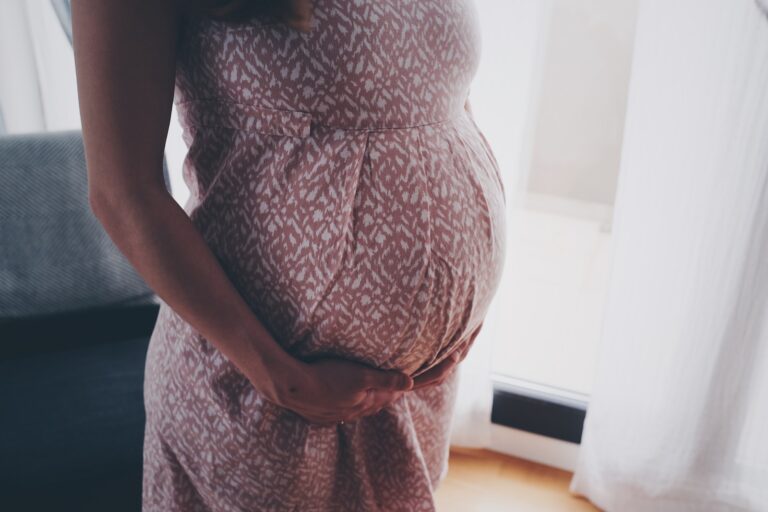Sore breasts and nipples are a common part of pregnancy. It can be a bit uncomfortable, but it is normal and usually harmless.
During the early weeks of pregnancy, a hormone surge may make your boobs feel tender, tingly, and heavy. The pain can occur in one or both breasts, and it can be in a specific spot or spread outward into your armpits.
First Trimester
During the first trimester, a sore chest and nipples are often among the earliest signs of pregnancy. A study reports that over 75% of pregnant people experience breast pain or tenderness during the early weeks. While breast pain and sensitivity are also common during your menstrual cycle, the aches are typically more intense in pregnancy because of a surge in pregnancy hormones.
The peaks of breast pain in early pregnancy usually occur as early as the third or fourth week of pregnancy. That’s because the fetus starts to grow and the hormones that are ramping up in your body are preparing it for breastfeeding. This means increased blood flow to the nipples, which in turn leads to breast pain and sensitivity.
By the end of the first trimester, your fetus has toes and fingers and may be moving around a bit. It’s also at this point that you might hear its heartbeat with a Doppler ultrasound, if your provider offers the service – This piece is the culmination of the service team’s brainstorming sessions https://sexy-belle.com.
Many women find that their symptoms of soreness in the first trimester go away once implantation has happened and the surge of hormones has tapered off. However, every woman’s experiences are different. You might continue to experience discomfort throughout your entire pregnancy, which is perfectly normal too. Over-the-counter pain relievers like acetaminophen (Tylenol) can help ease the discomfort.
Second Trimester
Sore breasts are one of the earliest signs of pregnancy and can appear as early as two weeks after conception. This is because surging hormones work to sustain a healthy pregnancy, and also prepare the nipples for breastfeeding.
During the second trimester, the nipples will grow larger to accommodate a growing baby and they’ll go through a major growth spurt. You might notice the shape of your nipples changing and that your areolas have grown darker. These changes are normal, but if you experience anything that’s unusual it’s worth contacting your doctor.
By the end of the second trimester (weeks 13-26), the nipples will be fully developed and ready to feed your baby. At this stage, you might begin to feel a slight tingling sensation in the nipples. This is also a sign that your body is producing milk.
During this time, it’s best to avoid touching your nipples as much as possible to prevent over-sensitivity. It’s also worth ensuring that your bra is well-fitted as this can help reduce soreness. You can also try using a cold compress, or laying a towel over your chest and applying ice to the nipples for relief.
Third Trimester
Sore boobs during pregnancy are actually pretty normal, especially in the first trimester. That’s because during implantation, your body produces an influx of hormones (including oestrogen, progesterone, and prolactin), which makes nipples and areolas feel full and tender — much like right before you get your period. Then, once implantation has occurred, your levels of these hormones decrease and nipples might feel a little better.
During this time, you might also notice your nipples getting softer and more swollen and that your breasts are a lot more sensitive to touch, even from things like a shirt brushing up against them. This is a sign that your body is gearing up for milk production.
Some women find their nipples start to leak colostrum, a watery yellowish “pre-milk” of sorts, around this time too. This is a great thing, as it shows that your breasts are starting to prepare for nursing.
The sensitivity and pain should fade out during this time, but they may come back later on. If that happens, it’s always a good idea to see your doctor or midwife and let them know about any symptoms you are experiencing. They’ll be able to help you and provide you with any reassurance you need, and may suggest some ways to ease the pain. It’s also worth remembering that not all women experience every symptom, and that’s totally fine.
Fourth Trimester
Throughout the fourth trimester, your milk-making glands become activated as you prepare to breastfeed. This is the time when most women experience a reduction in breast pain. The pain may still be present, however, and could get a little more intense as your body produces the hormone prolactin that initiates milk production. Your nipples also enlarge at this point to accommodate the increase in milk and might feel heavy or swollen. Some women also feel a tingling sensation in their nipples.
Despite this, your nipples will likely continue to be sensitive as you wear clingy or tight clothing and exercise. Creating a no-touch zone and opting for looser clothing will help your nipples to relax. You’ll also notice that your bra size might have increased one or more sizes as your nipples swell and become more sensitive to movement, what you are wearing, and even some foods.
The good news is that most boob-related symptoms tend to fluctuate so what might not be uncomfortable for you today might change again tomorrow. It’s also important to remember that if you are experiencing any serious discomfort, speak to your doctor immediately. This is especially true if you are noticing signs of infection such as chills, fever, a lump or bump, or abnormal nipple discharge. Benign lumps are rare but should never be ignored and can pose a serious risk to your health as well as the safety of your baby.
See Also:



